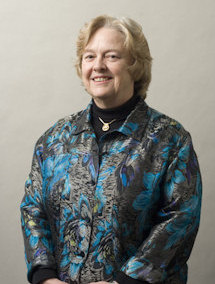
Professor Eccles’s current research interests relate specifically to what affects the choices children and adolescents make about how they spend their time. Her work—and that of her collaborators—has identified two fundamental foundations of student choice: their belief that they can master a task, called expectancy, and their belief that a task is worth doing, or value.
Professor Eccles speaks with eloquence about the fact that instilling in students the belief that they can succeed at a task is essential, but at least equally important is ensuring that they have the necessary skills. Parents and educators can inadvertently set students up for failure by convincing them they can succeed without also providing the requisite skills and strategies. But Professor Eccles recent work has focused more on what students choose to do when they believe they can succeed and they have the necessary skills. She examines students’ beliefs about the value of engaging in a specific task, and the factors that affect those beliefs.
Professor Eccles’s research has identified key characteristics that can influence students’ beliefs about the value of academic tasks. These include interest, utility, and cost, and all have implications for parents, teachers, and educational systems. Each of these factors relates to instilling in students the belief that academic tasks are worth doing when compared with other ways they could spend their time.
Interest is, in her view, the most critical. And it is the one over which educators have the most control. Though research is just beginning to uncover the ways that environment can affect the pleasure of a task, students’ interest and desire to do work can be shaped by the extent to which the task is:
- Relevant – tasks should be relevant to students’ lives and their goals
- Understandable, yet challenging – tasks should be responsive to students’ existing skills and should push them to achieve higher levels of understanding
- Cooperative – adolescents are social beings, and they respond to activities that involve their peers
These characteristics have significant implications for teachers and educational systems. We now know from research that systems can modify curricula to increase the likelihood that positive, interesting experiences can happen, and teachers must be able to create these opportunities in the classroom through their teaching.
Utility, or attainment value, relates to students’ understanding of why they might want to engage in the task if it is not inherently interesting to them. Current research indicates that students are more likely to work when they have a vision of where they are going and a sense of how schoolwork connects to that vision. Unfortunately, child and adolescent learners rarely have a clear sense of where they are going, and so Professor Eccles’s research—and that of others—suggests the importance of providing them a vision of their “possible future selves.”
This begins with models or images of successful people from all walks of life and in a variety of careers – and in ways that deviate from the caricatures of professionals they see on television. Students internalize these models over time when they are concrete, visual, and reinforced throughout their academic careers. Parents and educators can then help students understand the development and education chain that leads to those “future selves.” When students are aware of the variety of careers that connect to their interests and skills, and the education required for participation, they are more likely to be willing to work on current academic tasks.
As to cost, the third factor in student choice, students are known to make sophisticated decisions about their time. Like adults, they weigh the benefits and costs of engaging in specific tasks. Parents and educators may trivialize these decisions because the alternatives that students consider, such as hanging out with friends or playing video games, are not a part of the educational value system. Yet, this is a mistaken response: these alternatives are a part of the adolescents’ value system. When adults recognize this, and try to understand adolescents’ interactions with the world outside of school, they build trust. The more mindful adults are of students’ values and agendas, the more likely they are to earn students’ trust and get them to commit to academic success.
Professor Eccles believes that parents and educators can have great impact on adolescents by working to understand their lives and using that knowledge to better connect each student to learning and academics.
Selected Publications
Books
Chatman-Nelson, Celina, Oksana Malanchuk, and Jacquelynne S. Eccles. 2010. The changing face(s) of race and gender in the United States. Oxford : Wiley-Blackwell.
Watt, Helen M. G., and Eccles, Jacquelynne S. 2008. Gender and occupational outcomes : longitudinal assessments of individual, social, and cultural influences. Washington, D.C.: American Psychological Association. Abstract.
Meece, J., and Eccles, Jacquelynne S. 2008. Handbook of research on schools, schooling and human development. London: Routledge.
Mahoney, Joseph L., Reed W. Larson, and Jacquelynne S. Eccles. 2005. Organized activities as contexts of development: extracurricular activities, after-school and community programs. Mahwah, N.J.: Lawrence Erlbaum.
Downey, Geraldine, Jacquelynne S. Eccles, and Celina Chatman. 2005. Navigating the future : social identity, coping, and life tasks. New York: Russell Sage.
Eccles, Jacquelynne S., and J. Gootman. 2002. Community Programs to Promote Youth Development. Washington DC: National Academy Press.
Wigfield, Allen L., and Jacquelynne S. Eccles. 2001. Development of Achievement Motivation. San Diego, CA: Academic Press. Abstract.
Journal Articles
Bouchey, H.A., Shoulberg, E.K., K.A. Jodl, and Jacquelynne S. Eccles. 2010. "Longitudinal Links Between Older Sibling Features and Younger Siblings' Academic Adjustment During Early Adolescence." Journal of Educational Psychology, 102(1): 197-211. PMCID:PMC2849167. DOI. Local Access.
Fredricks, J.A., Alfeld, C., and Jacquelynne S. Eccles. 2010. "Developing and Fostering Passion in Academic and Nonacademic Domains." Gifted Child Quarterly, 54(1): 18-30. DOI. Local Access.
Lehnart, J., Neyer, F.J., and Jacquelynne S. Eccles. 2010. "Long-Term Effects of Social Investment: The Case of Partnering in Young Adulthood." Journal of Personality, 78(2): 639-670. DOI. Local Access.